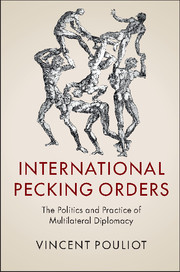Book contents
- Frontmatter
- Contents
- List of figures
- List of tables
- Preface and acknowledgments
- List of abbreviations
- Introduction: All the world's a stage
- Part I Situations
- Part II Dispositions
- Part III Relations
- Part IV Positions
- Conclusion: The “miracle” of multilateral pecking orders
- Appendix: Research design, methods and data
- References
- Index
Preface and acknowledgments
Published online by Cambridge University Press: 05 March 2016
- Frontmatter
- Contents
- List of figures
- List of tables
- Preface and acknowledgments
- List of abbreviations
- Introduction: All the world's a stage
- Part I Situations
- Part II Dispositions
- Part III Relations
- Part IV Positions
- Conclusion: The “miracle” of multilateral pecking orders
- Appendix: Research design, methods and data
- References
- Index
Summary
“Inequality is a central fact of international political life,” writes Andrew Hurrell in his widely acclaimed opus. Starting from a similar observation, this book is about the social production and negotiation of hierarchy on the world stage. I look at the counterintuitive case of multilateral diplomacy, which despite being formally premised on the principle of sovereign equality, actually takes place on a deeply unlevelled playing field. I aim to theorize and empirically document the manifold practices of social stratification in international politics, the ways in which inequality is generated, reproduced and contested, and more generally the pervasiveness of hierarchy as an ordinary condition of global life. While the book cannot aim to cover all of the different forms that social stratification takes in world politics, the theory and methodology that I put forward aspire to capture the basic dynamics of inequality production on the international stage.
When I first submitted a funding application for this project back in the fall of 2008, my working title was meant to paraphrase Hedley Bull's landmark book: The Hierarchical Society. Soon enough, though, references to international hierarchy became cottage industry in International Relations (IR). Thanks to this surge of scholarly interest, today there is arguably nothing particularly controversial in stating that world politics is less about anarchy than it is about hierarchy. The specific contribution of this book is in developing a theoretical framework about – as well as in empirically substantiating – the manifold social processes by which social stratification emerges on the global stage. Contrary to conventional wisdom, which focuses primarily on the distribution of state capacities, I contend that it is the structuring play of practice – itself enabled and constrained by situations, dispositions, relations and positions – that best explains what diplomats often refer to as international pecking orders.
In more than one way, this book may be construed as a sequel to my first single-authored book, International Security in Practice. In both cases, I am concerned with the politics of multilateral diplomacy and the social negotiation of meaning. In fact, this book arguably starts where I left off in 2010. In my analysis of NATO–Russia security relations, I concluded that the key irritant was the absence of an established distribution of ranks and roles to help structure the relationship.
- Type
- Chapter
- Information
- International Pecking OrdersThe Politics and Practice of Multilateral Diplomacy, pp. ix - xiiiPublisher: Cambridge University PressPrint publication year: 2016



